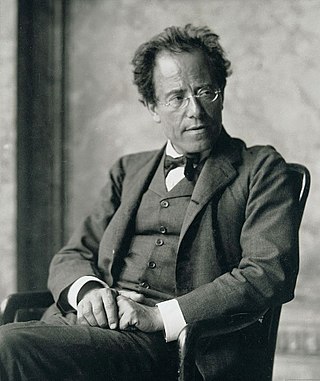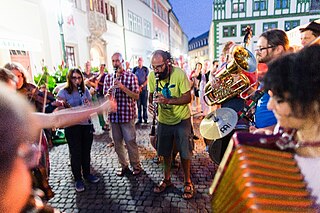
Karsten Troyke (born Karsten Bertolt Sellhorn on 14 August 1960 in Berlin) is a German singer of Jewish songs, as well as an actor and speaker.

Karsten Troyke (born Karsten Bertolt Sellhorn on 14 August 1960 in Berlin) is a German singer of Jewish songs, as well as an actor and speaker.
Troyke was born to a family with some Jewish ancestry, but is not matrilineally Jewish. His father Werner "Josh" Sellhorn had a Jewish father, who hid the family tree from officials by buying a fake "Aryan passport". [1]
Troyke worked in various jobs: as a gardener and with cognitively challenged children. He studied singing (with Leonore Gendries) as well as drama and speaking, performing on stage since 1982.
In 1990 he gave up work to dedicate himself full-time to musical performance and theater. Troyke participated in radio plays, worked as a voice actor (dubbing), and appeared in various stage plays.
As a singer, his album Yiddish Anders (1992) received the praise of German record critics. Jidische Vergessene Lieder (1997) contained previously unpublished songs of Sara Bialas Tenenberg, who became his mentor for the Yiddish language.
In his performances, Troyke worked with Bettina Wegner, Suzanna and the Trio Scho. His interpretations of the songs of Georg Kreisler received mention in the writer-musician's 2005 biography. In 2006, two documentaries, Yiddish Soul and Concert Yiddish Soul, featured Troyke, Shura Lipovsky, Myriam Fuks, and The KlezRoym.
Troyke holds workshops on interpreting Yiddish songs and teaches rare songs from his collection. He was a guest professor at the Jewish Music Institute of School of Oriental and African Studies (SOAS), London, at Carleton College Northfield (Minnesota) and at the summer school of Centre Medem, Paris.
In collaboration:

Gustav Mahler was an Austro-Bohemian Romantic composer, and one of the leading conductors of his generation. As a composer he acted as a bridge between the 19th-century Austro-German tradition and the modernism of the early 20th century. While in his lifetime his status as a conductor was established beyond question, his own music gained wide popularity only after periods of relative neglect, which included a ban on its performance in much of Europe during the Nazi era. After 1945 his compositions were rediscovered by a new generation of listeners; Mahler then became one of the most frequently performed and recorded of all composers, a position he has sustained into the 21st century.

Klezmer is an instrumental musical tradition of the Ashkenazi Jews of Central and Eastern Europe. The essential elements of the tradition include dance tunes, ritual melodies, and virtuosic improvisations played for listening; these would have been played at weddings and other social functions. The musical genre incorporated elements of many other musical genres including Ottoman music, Baroque music, German and Slavic folk dances, and religious Jewish music. As the music arrived in the United States, it lost some of its traditional ritual elements and adopted elements of American big band and popular music. Among the European-born klezmers who popularized the genre in the United States in the 1910s and 1920s were Dave Tarras and Naftule Brandwein; they were followed by American-born musicians such as Max Epstein, Sid Beckerman and Ray Musiker.

Yiddish Summer Weimar is an annual summer institute and festival for Yiddish music, language and culture which takes place in Weimar, Germany. Starting as a 3-day workshop in 1998, it was officially founded in its current form in 2006 and has grown to become one of the most important festivals and educational organizations for Klezmer, Yiddish song, Yiddish Language, dance and culture. It is known for its transcultural and transnational perspective which supports an international learning community, for the pedagogical approach of its founder, Alan Bern, and for its commitment to the creation and presentation of historically informed, contemporary Yiddish artistic production.